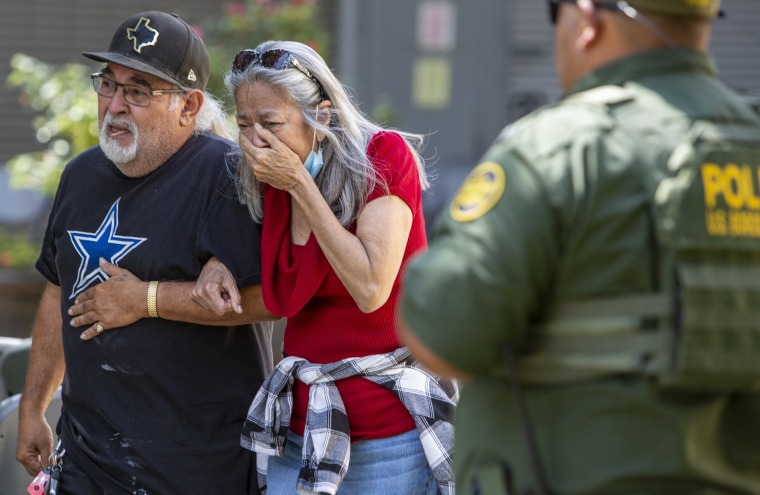Editor's note: TODAY first interviewed grief expert David Kessler after two mass shootings in 24 hours shook the nation in 2019. The country is now once again in shock and mourning after a gunman killed at least 19 children and two teachers in an elementary school in Uvalde, Texas. It happened just days after 10 people were killed in a mass shooting at a supermarket in Buffalo, New York.
Grief expert David Kessler has a unique understanding of what the survivors of the Texas school shooting and their community are going through.
As a 13-year-old in 1973, Kessler was visiting his dying mother in a New Orleans hospital when a gunman took over a nearby hotel and began shooting. He saw first responders, police officers and hotel guests killed in front of him.
“Having my mother die just a couple of days later… I think those kinds of things can either paralyze us or turn us into a grief expert,” Kessler, author of the upcoming book, "Finding Meaning: the Sixth Stage of Grief," told TODAY.
He shared his advice about dealing with loss and how to heal:
Why are the shootings so profoundly sad for people who didn’t lose anyone?
Kessler: While you may not be personally affected, it feels personal because their lives remind us of our lives. We go to the store, a theater, a concert. It also brings out our own fears about: Could we be next? How safe is the world? We’re not quite as disconnected as we think we are because these are normal people doing normal things.
New loss often triggers old losses. Don’t be surprised if these deaths in the news take you back to your own loss.
What about people who are grieving the loss of a family member?
Kessler: We need to help them get through the next few days. It’s about keeping them safe and connecting with their loved ones. Their lives will never be the same. This is a devastating loss. This isn’t something they’re going to get over. They’re going to learn to live with it.
But they are not alone. While we can’t bring their loved ones back, we can try to do things in the world to honor them and do our best to make sure these shootings won’t happen again.
The memorials become very important. We want our grief to be seen. We want people to know what has been lost. When we go to these community gatherings, it helps families know we get what has happened, we see the enormity of their loss. Gathering at a candlelight vigil or a funeral — it’s how we let them know their loss matters to us, too.
Why do we grieve so powerfully?
Kessler: Grief is a part of the love we had for that person. Grieving is what comes from having connections in this life. Grieving means their life was important, it mattered and it touched us. There is no timeline in grief, we don’t get over it, we learn to live with it. But in time we can learn to honor the person, to talk about it, say a prayer, light a candle, take time to feel it and fully grieve it.
Grief is as unique as our fingerprint. No two people’s griefs look alike, even in the same family. We all experience grief differently.

What is your advice for people who survived the shootings, but saw others die?
Kessler: As soon as they can, seek help and counseling.
When I’ve worked with shooting survivors, I help them try to understand when they go outside or to a public place that horrible moment has ended. The shooting is over. That was then, this is now. I want to help people understand that now they are safe, now they are OK.
As much as we hear about post traumatic stress, more people end up with post traumatic growth. It’s where we integrate the loss into our lives and we actually find meaning and grow from it.
What would you say to people who are now anxious about going to a public place?
Kessler: Fear doesn’t stop death, fear stops life.
Remember that anything is possible, but not probable. So of course it’s possible there could be another shooting at a store or a bar or a theater, but it’s not likely. These events are horribly tragic, but we also have to put the loss in perspective. Many things we do in life are risky, but the chances are on our side that when we go out, we are going to be safe.
How can people deal with anniversaries of such horrible events?
Kessler: There’s nothing to celebrate, but I think we want to mark it. Some people want to get together; others want to grieve very privately. Do what works for you.
For those who are directly affected, the days leading up to the anniversary are usually more anxiety filled than the actual day because we’re beginning to anticipate the anniversary and we have fear about the pain we’ll be in.
How can people cope with all of this?
Kessler: Doing something helps, whether it’s giving to the Red Cross or donating to the families or helping out in your community. Making positive changes in the world in the face of tragedy seems to help us.
We see communities band together so beautifully after these losses. We have to band together to keep each other safe before the losses and maybe be able to prevent more of them.
This interview was condensed and edited for clarity.

